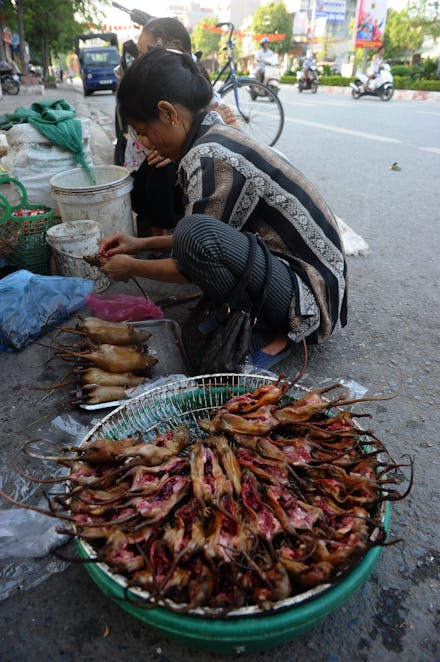A Vietnamese Tradition Is Back on the Menu

If you faint at the squeak from a mouse or shriek at the sight of a subway rat, then Vietnam's growing dinner table staple — rice field rats — probably isn't for you.
Field rats are a delicious and savory part of the local cuisine. Cambodia has a booming business catching the rodents and then selling them to Vietnam, where "they're regarded as 'good meat,'" reports ABC News.
Rat meat: The diet of these Cambodian rats consists mostly rice, vegetable stalks and wild plant roots, and are therefore considered better than their urban counterparts. City rats "are dirty and they have a lot of scabies on their skin. That's why we don't catch them," local Cambodian farmer Chhoeun Chhim told the BBC.
The "rice field meat" can be cooked in many different ways, including in a soup, grilled or as pate. Some have described the meat as tasting as good as chicken, while others maintain that it tastes more like pork.
Additionally, some Vietnamese farmers believe there are medicinal benefits to the rat meat. For example, some farmers think that cooking it in a certain way with vegetables and herbs can alleviate back pains.
Not-so-common delicacies around the world: To Americans, rats may seem like an unusual protein-based meal option, but many cultures and countries that eat and even treasure rodents. Peruvians, most notably, eat guinea pigs, oftentimes literally from head to toe.
In Ghana, cane rats are farmed to be eaten, and vendors in Thailand often cook up rat. While rodents are often considered carriers for disease, the rats being eaten are basically ingesting "organic" diets, so infections should be rare.
On top of that all, eating rodents is actually good for the environment as a supplemental protein alternative to beef, pork and poultry. You may or may not be convinced, but in Vietnam, it's a menu option that is on the rise.
h/t BBC